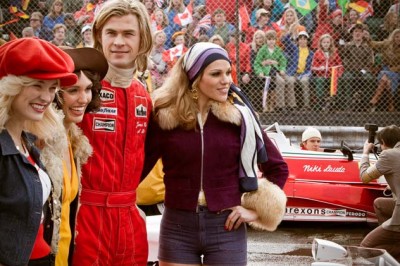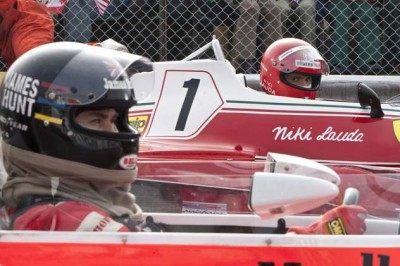
Ron Howard’s latest blast of solidly middle-brow, largely faceless entertainment, Rush, has everything modern technology can offer — right up to and including what I can only call the piston-cam. Otherwise, apart from a little nudity and swearing, this isn’t all that much different than John Frankenheimer’s Grand Prix (1966) — except that Grand Prix was in Cinerama on its original engagements and was about 50 minutes longer. (In a measure of how things have changed, Grand Prix had to raise engine noises to mask the word “ass” in order to get an MPAA certificate in those pre-rating days.) I can’t say I expected much more. It may even be apt, since Howard’s work invariably resembles nothing so much as mainstream Hollywood of 50 years ago: well-crafted, relatively impersonal, slightly corny, unlikely to frighten the horses. It’s also why Howard remains a bankable director. (You may shake your head over those silly Dan Brown thrillers, but they make a lot of money.)

Rush is a fact-based story built around the mid-1970s rivalry of Formula One racing drivers James Hunt (Chris Hemsworth, Thor) and Niki Lauda (Daniel Brühl, Inglourious Basterds). Near as I can tell, Peter Morgan’s (Frost/Nixon) screenplay hews pretty closely to the facts — allowing for the insertion of audience-pleasing outcroppings of corn. And the actors handle the demands of that screenplay pretty well, capturing both Hunt’s golden rock-star posturing and Lauda’s equally arrogant Teutonic professionalism. They also look the parts. Though prone to taking off Hemsworth’s clothes, Howard mostly avoids showing much of his very un-1970s gym-rat torso. Unfortunately, his evocation of what the era sounded like is something that should have been entrusted to someone with a better record collection.

As the story of rival professionals, Rush works reasonably well in its Hollywoodized way. There’s no real attempt at any kind of depth here. As character development goes, it never gets much beyond the pair learning that neither is quite the “asshole” they thought. And blessedly, the film never pretends that it is in any way more than a slick entertainment — albeit one tarted up with an epilogue to lend some kind of historical weight to it all. Of course, it’s possible that the characters were really no deeper than the shorthand sketches the film opts for, including its conclusion that it took the two of them to goad each other to greatness.

In terms of a racing picture, it’s undeniably flashy and looks terrific. The rapid cutting and the montage-like presentation undeniably convey a sense of excitement. But the more I think about it, the more I wonder if the film doesn’t rely too much on this and tote boards and announcers telling us what’s happening rather than coherently showing us. I’m not at all sure that Frankenheimer’s old nuts-and-bolts approach to racing scenes wasn’t actually a greater accomplishment when all is said and done. Grand Prix felt like an event, while Rush feels like a plain old movie. But as a plain old movie, it’s certainly entertaining enough. Rated R for sexual content, nudity, language, some disturbing images and brief drug use.
Playing at Carmike 10, Epic of Hendersonville




But the more I think about it, the more I wonder if the film doesn’t rely too much on this and tote boards and announcers telling us what’s happening rather than coherently showing us.
This has a way of hampering most sports-themed movies. But I didn’t hold much hope that Howard, who –after allowing for a couple tech-driven flourishes, as you mention– is about as artistically imaginative as my left sock, would find a way around the montage-fueled sportscaster approach.
I was certainly entertained, but I would’ve liked more out of the movie beyond racetrack excitement. The high note for me in terms of character drama occurs when Thor beats up the jackass reporter.
It was the highlight, but it didn’t really go anywhere, did it?
In a measure of how things have changed, Grand Prix had to raise engine noises to mask the word “ass” in order to get an MPAA certificate in those pre-rating days.
They played the same gag in this, but with ‘cunt’ instead of ‘ass’. Insert your own punchline here.
I liked this and found the racing scenes nicely exciting, although not as exciting as the bloke who had a heart attack in the screening I was in found them.
The difference is this was self-censorship, not pleasing the MPAA.
This movie is fine, but I’ll never see it again and I’m already on the path to forgetting it.